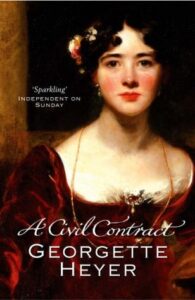 A Civil Contract, Georgette Heyer
A Civil Contract, Georgette Heyer
A Civil Contract is quite unlike Heyer’s other novels, because the romance is understated and, indeed, there isn’t much romance at all, at least not in the same sense. It’s a much more practical novel, dealing with the realities of life: more or less arranged marriages, marriages of convenience, unsuitable matches… The most entertaining thing about it is the clash between the aristocratic main character and his father-in-law, Mr Chawleigh. In fact, Mr Chawleigh quite steals the show on a number of occasions.
Jenny is one of Heyer’s better-realised heroines in one sense: she is practical, not very subtle, and devoted from the start to making her new husband comfortable and happy. Of course, that’s a stereotype too, and one which readers may well find less engaging than the sharp back-and-forth of Heyer’s Sophy (for one example). Still, Jenny clearly knows her own mind and does not regret things, although she does have human feelings — wishful thinking, some jealousy, etc, etc. I find her interesting because she’s so untypical of Heyer — a cosy little homemaker! And one with whom we sympathise, even though I did feel that Julia’s flaws were somewhat overdone, in a sort of ‘well, if Julia’s too nice then Jenny isn’t going to come into her own at all’ sort of way.
Really, A Civil Contract is about marriage, not about courting (like The Convenient Marriage, which has some similarities, though not in the characters); it’s about a quieter sort of love, not a grand passion. It’s about making the best of things, and about having a partner who you can rely on. Adam finally realises that that’s what he has in Jenny, and that’s lovely: the way his snobbishness initially gets in the way is annoying, but he learns.
As someone in a nearly eleven-year relationship (not to mention someone who feels no sexual attraction at all), this is in many ways more true of my experience, and it’s nice to see it in a romance novel (of sorts; I think this is less clearly romance than some of Heyer’s others, but if we divide her work into historicals, romances and mysteries… this seems to fit most into the romance section, being too recent in date for the historicals and clearly not a mystery). It might be fun to have a passionate doomed love for someone, but what matters is whether you can work together, work things out together, communicate. Jenny and Adam do model that, as each learns to discuss things with the other and share their lives.
In other ways, A Civil Contract is interesting because of the background of the French Revolution, the perspective of Adam as a former soldier, and the class mixing which happens as a result of the marriage. There are some very entertaining characters, including some very determined and headstrong women who are very different to Jenny, but still positive. (Lady Nassington is one; Lady Oversley is another, in a way; and of course, Lydia.)
All in all, this isn’t one of the more adventurous stories, like The Talisman Ring, and neither is the romance one with tension or too much worry about how it’s going to work out. It is, for the most part, fairly comfortable — though I wonder if perhaps it would have been less so in more class-conscious times. (Says the daughter of a working class man and a upper-middle-class woman, whose families cordially, and sometimes not so cordially, hated each other!)

Leave a Reply